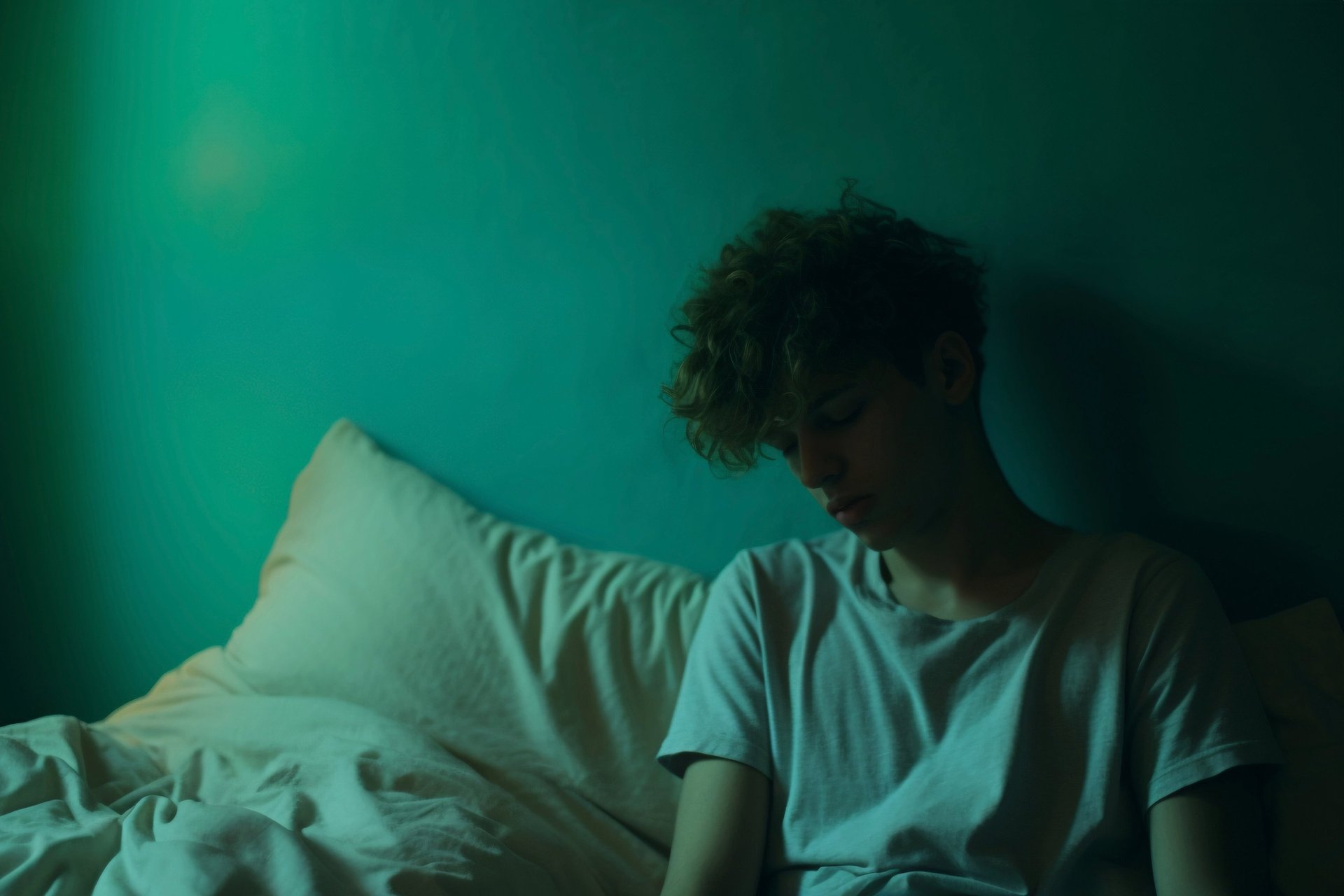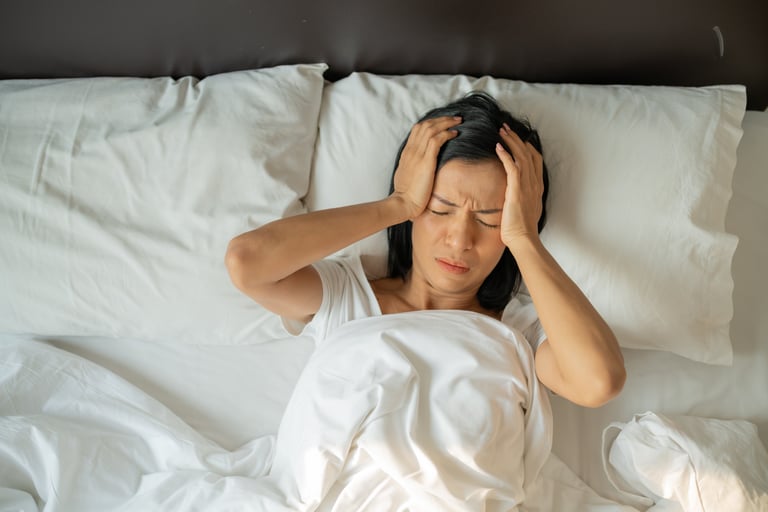Sleep Deprivation Psychosis: What It Feels Like and How to Recover
Quality Sleep is essential physical and mental well-being. Ongoing sleep loss can lead to severe complications such as sleep deprivation psychosis.
Faiza Zulfiqar
9/2/20244 min read


Sleep is a natural process essential to mental and physical well-being. When sleep is consistently compromised, it can lead to severe complications such as sleep deprivation psychosis. In this blog, we will discuss what sleep deprivation psychosis is, how it feels, its effects, especially in the postpartum period, and how to recover from it.
Sleep Deprivation Psychosis: What is it?
Sleep deprivation psychosis is a severe mental health condition that is caused by prolonged lack of sleep. It can be described as a severe mental illness that results in the inability to distinguish between the real and imaginary world, and it manifests itself through hallucinations, delusions, and impaired cognitive functioning.
How Does Sleep Deprivation Psychosis Feel?
Going through sleep deprivation psychosis is something very overwhelming and uncomfortable. Common symptoms include:
Hallucinations
Hallucination is perceiving things that are not nonexistent, such as seeing things that are not there or hearing voices that are not real.
Delusions
Having paranoid or grandiose false beliefs or perceiving reality in a way that is irrational and not based on facts.
Paranoia
Paranoid or psychotic symptoms such as severe social phobia or an intense sense of persecution.
Confusion
Problems with concentration or any form of decision-making.
Mood Swings
Mood swings from being in high spirits to being at the lowest point.
Disorganized Behavior
Lack of ability to perform everyday tasks or maintain normal routines.
How Long Does Sleep Deprivation Psychosis Last?
The duration of sleep-deprived psychosis can vary. If the cause of sleep deprivation is identified, then it can take a few days to weeks for the symptoms to disappear. However, sleep deprivation for a longer period or untreated sleep deprivation may prolong the period of such a condition.
What Is Recovery Like?
Recovery from sleep deprivation psychosis depends on several factors:
The severity of Symptoms
Mild conditions may last a few days and could be resolved by adequate sleep, while severe cases may take longer time and require medical attention.
Underlying Causes
It is essential to treat any sleep disorders or mental health problems if present to ensure a faster outcome.


How Sleep Deprivation Psychosis Affects You
Lack of sleep psychosis is one of the conditions that can greatly affect your day-to-day functioning. It can affect your work performance, relationships, and general well-being in society. If not treated, it can result in other mental health issues or worsen the ones already present in a patient.
Causes of Sleep Deprivation Psychosis
Sleep deprivation psychosis usually results from extreme and prolonged lack of sleep. The following are some common causes why people suffer from sleep deprivation psychosis:
Insomnia
Chronic inability to sleep or to remain asleep for long periods may lead to severe sleep deprivation.
Sleep Disorders
Continual conditions such as sleep apnea or narcolepsy interfere with the normal sleep routines.
Stress and Anxiety
Stress and anxiety can make it difficult for a person to sleep, hence leading to sleep deprivation.
Substance Abuse
Substances such as drugs and alcohol can also affect the quality of sleep, hence resulting in sleepless nights.
Work and Lifestyle
Stressful working conditions and irregular and long working hours affect the quality of sleep.
Treatment and Management
The good news is that with proper treatment and management, sleep-deprived psychosis can be addressed effectively. Here are some steps to help manage and recover from this condition:
Treatment and management of sleep deprivation psychosis involves:
Restoring Sleep
The primary treatment is to enhance the quality of sleep. This may include changing the amount of sleep one gets, developing a proper sleeping routine, or the use of sleep-inducing substances under prescription.
Lifestyle Changes
Some basic sleep hygiene principles should be followed by maintaining a consistent sleep schedule. Adopt healthy sleep habits, such as maintaining a regular sleep schedule, creating a restful environment, and avoiding stimulants before bedtime.
Seeking Medical Help
It is recommended to seek professional medical advice for the effective treatment of this condition, which may require medications and therapy.
Therapy
It is also important to note that through Cognitive-behavioral therapy (CBT), one can tackle problems relating to sleep and mental health. It can offer advice on how to cope with stress and improve sleep hygiene.
Addressing Underlying Issues
They should also seek help from a doctor to treat disorders or stress-related problems that may be causing the problem.
Building Support Systems
Talk with family and friends or join support groups as a way of getting emotional and practical support.
Preventing Sleep Deprivation Psychosis
To prevent sleep deprivation psychosis, consider:
Maintaining a Regular Sleep Schedule
People should make a routine and try every day to go to bed and wake up at the same time.
Creating a Sleep-Friendly Environment
In particular, the bedroom should be as quiet as possible, as dark as possible, and as comfortable as possible.
Managing Stress
Add relaxation techniques into your daily routine, such as meditation or deep breathing exercises.
Limiting Stimulants
One should also avoid foods that have caffeine and heavy foods before going to bed.
Conclusion
Sleep deprivation psychosis is a serious condition that highlights the importance of quality sleep for mental health. If you have severe sleep deprivation, then it is advisable to seek professional help. It is, therefore, evident that sleep and proper management of it can make a significant difference in your overall well-being.
To learn more about treating sleep issues, one should seek help from doctors and other health care practitioners. It is crucial to pay enough attention to your health, especially your sleeping pattern. In doing so, your mental health leads to a balanced and fulfilling life.
